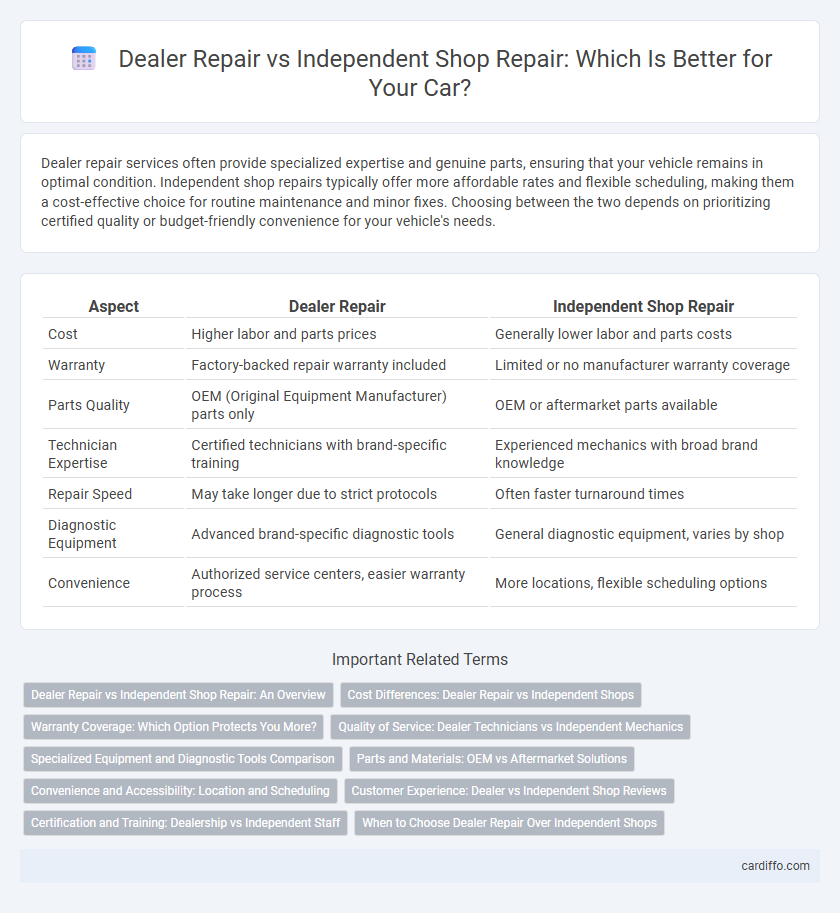Dealer repair services often provide specialized expertise and genuine parts, ensuring that your vehicle remains in optimal condition. Independent shop repairs typically offer more affordable rates and flexible scheduling, making them a cost-effective choice for routine maintenance and minor fixes. Choosing between the two depends on prioritizing certified quality or budget-friendly convenience for your vehicle's needs.
Table of Comparison
| Aspect | Dealer Repair | Independent Shop Repair |
|---|---|---|
| Cost | Higher labor and parts prices | Generally lower labor and parts costs |
| Warranty | Factory-backed repair warranty included | Limited or no manufacturer warranty coverage |
| Parts Quality | OEM (Original Equipment Manufacturer) parts only | OEM or aftermarket parts available |
| Technician Expertise | Certified technicians with brand-specific training | Experienced mechanics with broad brand knowledge |
| Repair Speed | May take longer due to strict protocols | Often faster turnaround times |
| Diagnostic Equipment | Advanced brand-specific diagnostic tools | General diagnostic equipment, varies by shop |
| Convenience | Authorized service centers, easier warranty process | More locations, flexible scheduling options |
Dealer Repair vs Independent Shop Repair: An Overview
Dealer repair services typically offer manufacturer-trained technicians and genuine OEM parts, ensuring compatibility and warranty protection. Independent shops often provide lower labor rates and flexible service options, appealing to budget-conscious customers without compromising basic repair quality. Choosing between dealer and independent repair centers depends on factors like vehicle age, warranty status, and specific repair needs.
Cost Differences: Dealer Repair vs Independent Shops
Dealer repair services typically come with higher labor rates and original manufacturer parts, which can increase overall costs compared to independent shops. Independent repair shops often offer more competitive pricing due to lower overhead and the option to use aftermarket or recycled parts without compromising quality. Choosing between dealer and independent repair centers depends on balancing cost savings against potential variations in warranty coverage and specialized expertise.
Warranty Coverage: Which Option Protects You More?
Dealer repairs typically offer warranty coverage that aligns directly with the vehicle manufacturer, ensuring repairs are backed by original parts and certified technicians, which maximizes protection for your investment. Independent shop repairs might provide shorter or limited warranties that vary by shop, often covering labor and parts but lacking the extensive coverage dealers guarantee. Choosing dealer repairs generally offers better warranty protection, reducing out-of-pocket expenses for future vehicle issues linked to the repair.
Quality of Service: Dealer Technicians vs Independent Mechanics
Dealer technicians receive extensive training directly from vehicle manufacturers, ensuring in-depth knowledge of specific car models and access to the latest diagnostic tools, which often results in higher quality repairs. Independent mechanics may offer personalized service and lower prices but can lack specialized expertise and manufacturer-backed training, potentially affecting repair accuracy and overall quality. Choosing dealer repair often guarantees warranty compliance and genuine parts, contributing to superior service outcomes compared to many independent shops.
Specialized Equipment and Diagnostic Tools Comparison
Dealer repair centers feature specialized equipment and manufacturer-specific diagnostic tools precisely calibrated for brand-specific vehicles, ensuring accurate fault detection and repairs. Independent shops typically use versatile, multi-brand diagnostic scanners and generic tools, which can be effective but may lack the depth of specialized software and proprietary systems found at dealers. The advanced technical resources at dealer facilities often translate to quicker, more reliable diagnoses for complex issues, particularly with newer vehicle models.
Parts and Materials: OEM vs Aftermarket Solutions
Dealer repair shops typically use OEM parts, ensuring precise fit and manufacturer warranty compliance, which often results in higher reliability and vehicle performance. Independent shops frequently opt for aftermarket parts that offer cost savings and broader availability but can vary significantly in quality and durability. Choosing between OEM and aftermarket materials impacts the longevity and resale value of the vehicle, making it a crucial consideration during repairs.
Convenience and Accessibility: Location and Scheduling
Dealer repair centers often provide superior convenience with multiple locations nationwide and extended hours, enabling easier scheduling for customers. Independent shops may offer flexible appointment times and quicker turnaround, but their fewer locations can limit accessibility for some vehicle owners. Prioritizing proximity and scheduling options helps determine the best repair service for timely and hassle-free maintenance.
Customer Experience: Dealer vs Independent Shop Reviews
Customer experience with dealer repairs often highlights certified technicians and genuine parts, ensuring reliability and warranty compliance. Independent shops typically receive praise for personalized service, faster turnaround times, and more affordable pricing. Online reviews reveal mixed sentiments, with dealers favored for consistency and independents valued for cost-effectiveness and customer rapport.
Certification and Training: Dealership vs Independent Staff
Dealership repair technicians typically hold factory certifications and receive ongoing training directly from vehicle manufacturers, ensuring they are updated on the latest models and specialized repair techniques. Independent shop staff may have ASE (Automotive Service Excellence) certifications and varied training backgrounds but often lack manufacturer-specific updates. This difference in certification and training can impact the quality and accuracy of repairs, especially on newer, complex vehicle systems.
When to Choose Dealer Repair Over Independent Shops
Dealer repair offers specialized expertise, original manufacturer parts, and warranty protection, making it essential for complex or brand-specific issues. Vehicles under manufacturer warranty or recall require dealer servicing to maintain coverage and ensure compliance with manufacturer guidelines. Choosing dealer repair is crucial for maintaining vehicle longevity and securing software updates exclusive to authorized service centers.
Dealer repair vs Independent shop repair Infographic

 cardiffo.com
cardiffo.com